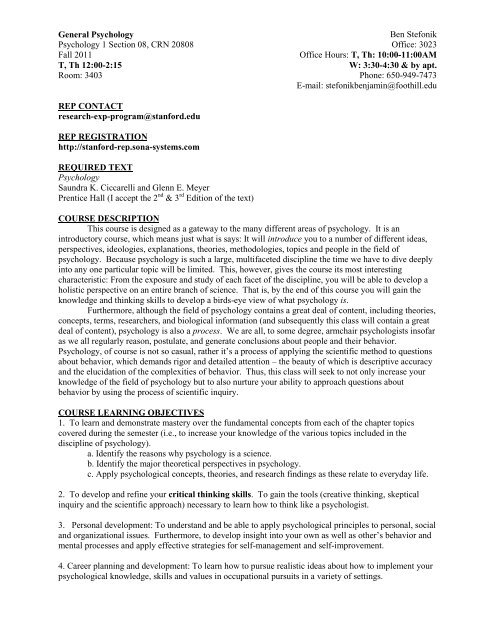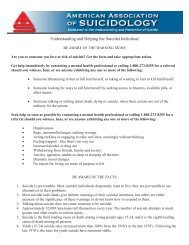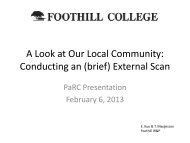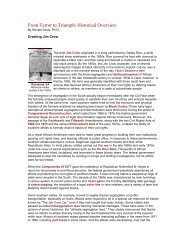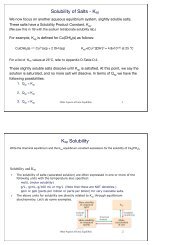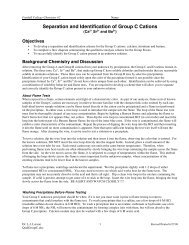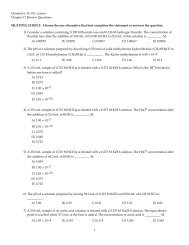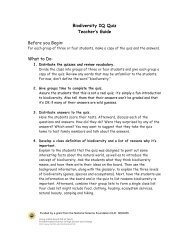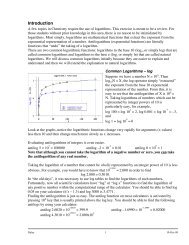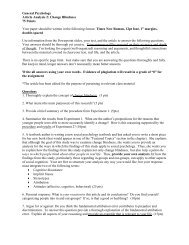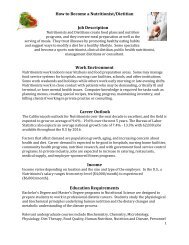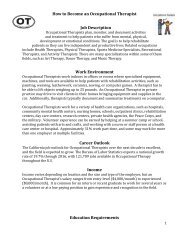General Psychology Psychology 1 Section 08 ... - Foothill College
General Psychology Psychology 1 Section 08 ... - Foothill College
General Psychology Psychology 1 Section 08 ... - Foothill College
You also want an ePaper? Increase the reach of your titles
YUMPU automatically turns print PDFs into web optimized ePapers that Google loves.
<strong>General</strong> <strong>Psychology</strong><br />
<strong>Psychology</strong> 1 <strong>Section</strong> <strong>08</strong>, CRN 2<strong>08</strong><strong>08</strong><br />
Fall 2011<br />
T, Th 12:00-2:15<br />
Room: 3403<br />
REP CONTACT<br />
research-exp-program@stanford.edu<br />
REP REGISTRATION<br />
http://stanford-rep.sona-systems.com<br />
REQUIRED TEXT<br />
<strong>Psychology</strong><br />
Saundra K. Ciccarelli and Glenn E. Meyer<br />
Prentice Hall (I accept the 2 nd & 3 rd Edition of the text)<br />
Ben Stefonik<br />
Office: 3023<br />
Office Hours: T, Th: 10:00-11:00AM<br />
W: 3:30-4:30 & by apt.<br />
Phone: 650-949-7473<br />
E-mail: stefonikbenjamin@foothill.edu<br />
COURSE DESCRIPTION<br />
This course is designed as a gateway to the many different areas of psychology. It is an<br />
introductory course, which means just what is says: It will introduce you to a number of different ideas,<br />
perspectives, ideologies, explanations, theories, methodologies, topics and people in the field of<br />
psychology. Because psychology is such a large, multifaceted discipline the time we have to dive deeply<br />
into any one particular topic will be limited. This, however, gives the course its most interesting<br />
characteristic: From the exposure and study of each facet of the discipline, you will be able to develop a<br />
holistic perspective on an entire branch of science. That is, by the end of this course you will gain the<br />
knowledge and thinking skills to develop a birds-eye view of what psychology is.<br />
Furthermore, although the field of psychology contains a great deal of content, including theories,<br />
concepts, terms, researchers, and biological information (and subsequently this class will contain a great<br />
deal of content), psychology is also a process. We are all, to some degree, armchair psychologists insofar<br />
as we all regularly reason, postulate, and generate conclusions about people and their behavior.<br />
<strong>Psychology</strong>, of course is not so casual, rather it’s a process of applying the scientific method to questions<br />
about behavior, which demands rigor and detailed attention – the beauty of which is descriptive accuracy<br />
and the elucidation of the complexities of behavior. Thus, this class will seek to not only increase your<br />
knowledge of the field of psychology but to also nurture your ability to approach questions about<br />
behavior by using the process of scientific inquiry.<br />
COURSE LEARNING OBJECTIVES<br />
1. To learn and demonstrate mastery over the fundamental concepts from each of the chapter topics<br />
covered during the semester (i.e., to increase your knowledge of the various topics included in the<br />
discipline of psychology).<br />
a. Identify the reasons why psychology is a science.<br />
b. Identify the major theoretical perspectives in psychology.<br />
c. Apply psychological concepts, theories, and research findings as these relate to everyday life.<br />
2. To develop and refine your critical thinking skills. To gain the tools (creative thinking, skeptical<br />
inquiry and the scientific approach) necessary to learn how to think like a psychologist.<br />
3. Personal development: To understand and be able to apply psychological principles to personal, social<br />
and organizational issues. Furthermore, to develop insight into your own as well as other’s behavior and<br />
mental processes and apply effective strategies for self-management and self-improvement.<br />
4. Career planning and development: To learn how to pursue realistic ideas about how to implement your<br />
psychological knowledge, skills and values in occupational pursuits in a variety of settings.
IMPORTANT POLICIES<br />
1. Student takes sole responsibility for withdrawal procedures from the course.<br />
2. Make sure that the e-mail you have on file with <strong>Foothill</strong> <strong>College</strong> (through the Banner System) is valid<br />
and is one which you regularly check. Sometimes I may need to send an e-mail to the entire class and if<br />
your e-mail is not accurate, you may not get information that you need.<br />
3. All exams must be completed in class during the regularly scheduled time unless the student has<br />
worked out an arrangement prior to the exam date.<br />
4. Disruptive behavior and derogatory comments will not be tolerated. We will seek to foster an<br />
inclusive and respectful atmosphere where all opinions, beliefs, attitudes and religious backgrounds are<br />
respected. Derogatory, homophobic, racist, or sexist language is unacceptable. Students who are<br />
disruptive in class will be asked to leave and will be required to have a meeting with the professor and the<br />
dean of student affairs.<br />
5. Plagiarism is unacceptable. Evidence of plagiarism on any assignment will result in a score of 0 for<br />
that assignment. Even one sentence plagiarized will earn you a score of “0”. Plagiarism is defined as:<br />
to steal and pass off another person’s words as your own (even definition of terms)<br />
to use other people’s productions without crediting the source.<br />
copying a sentence, but only changing 1-2 words<br />
If you use the exact words from another person’s text, you MUST quote and cite the text. If you<br />
do not, it is plagiarism.<br />
6. If you have any questions regarding anything about this course, please feel free to e-mail me, talk to me<br />
after class, stop by my office hours, or arrange an appointment with me. Also, college is a professional<br />
environment. All correspondence with me via e-mail should reflect this professionalism. E-mails that<br />
read like text messages are frowned upon by both me as well as the broader academic community. Please<br />
use correct spelling, grammar, and punctuation with all e-mails. However, do not be concerned about<br />
minor errors. We are all human, and humans make errors! Just be sure to be respectful and appropriately<br />
formal.<br />
GRADING SCALE<br />
A = 90% and up<br />
B = 80–89%<br />
C = 70–79%<br />
D = 60–69%<br />
F = 59% and below<br />
Source Portion of<br />
Grade<br />
Quizzes 15%<br />
Exams 30%<br />
Homework & 35%<br />
Article Analyses<br />
Participation 10%<br />
REP Program 10%<br />
*I grade by adding cumulative total points/total possible points<br />
**Extra credit opportunities will be available throughout the quarter and will count toward your<br />
cumulative total points.
ASSIGNMENTS AND QUIZZES<br />
Quizzes: In addition to a midterm and a final, there will be several multiple-choice quizzes throughout<br />
this course.<br />
Article Analysis: You will be required to read and provide a critical analysis of several primary source<br />
research studies. There are research studies that have been published in peer-reviewed journals and<br />
provide you will a first-hand account of how psychology generates knowledge. I consider these<br />
assignments to be the heart of the course, because it gives you the opportunity to participate in the process<br />
of psychological inquiry.<br />
Readings: Finally, another critical factor to your success in this course is that you complete the readings<br />
for each chapter. For each chapter you will be given a list of concepts/topics to read. I expect you to<br />
have a thorough understanding of the concepts and topics I assign from the text. I suggest taking notes<br />
from the readings and “adding them” to the notes from the lecture of each chapter. Quizzes and tests will<br />
contain questions from both the lectures as well as the materials you are required to read from the<br />
textbook.<br />
LATE WORK<br />
Late work will not be accepted. In order to receive credit for an assignment, you must complete it on<br />
time. Late work will only be accepted if you speak with me before the deadline to arrange an extension.<br />
This is final. If you are absent the day a paper is due, you MUST send me the assignment in an e-mail<br />
before the class period begins. The assignment must be attached as a .doc or .docx format. If you do not<br />
have MSWord, then you must paste the text into the body of the e-mail. I DO NOT ACCEPT ANY<br />
ATTACHMENTS OTHER THAN .doc or .docx<br />
REP INFORMATION (SUMMARY)<br />
Your Credit Requirements: 5.3<br />
SONA Registration & Demographic Survey<br />
(Due: Fri. Oct. 7, 5pm) (for 1 Credit)<br />
All study credits can be completed with inperson<br />
studies but you must complete a<br />
minimum of 2 in-person study credits.<br />
The remaining 2 study credits can be completed<br />
by online studies<br />
Mandatory Exit Survey (starts during last 2<br />
weeks of the course). (for .3 credits)<br />
REP DEADLINE: Fri. Dec. 9, 5pm<br />
REP PROGRAM GRADING<br />
REP program participation will count for 50 points. You must complete the REP program OR the<br />
alternative assignment. For the REP program you will be required to complete 5.3 credits of study<br />
participation. If you choose to participate in the REP program, you will need to complete a minimum of<br />
3.3 credits to earn ANY points. When you complete 3.3 credits, you will have received 30 points. After<br />
3.3 credits, each 0.5 credit will be worth 5 points up to 50 points. If you do not complete the exit<br />
survey, your score will be deducted 5 points.<br />
I do not give extra credit for completing extra REP credits beyond the requirement.<br />
REP CONTACT<br />
research-exp-program@stanford.edu<br />
ALTERNATIVE ASSIGNMENT<br />
If you choose the alternative assignment, you will be required to complete a 5 page research paper. The<br />
paper will be a summary of two primary source research articles. The paper must include summaries of<br />
the thesis, supporting arguments, research methods, and conclusions of two experimental research<br />
articles. I will provide a more detailed prompt for the writing assignment if you choose this option.
ATTENDANCE POLICY<br />
Attendance and participation are critical to this course. Your participation score will be measured by:<br />
attending class, taking good notes, being present and engaged, contributing to class discussions, and<br />
participating in group activities (there will be several throughout the semester). Participation will be a<br />
significant factor in your final grade. We will have aprox. 20 days of instruction and each day of your<br />
attendance and participation will be worth 1 point toward your final grade (days in which there are group<br />
activities will be worth 2 pts). Thus, by simply attending and participating in class you will be earning<br />
points toward your final grade.<br />
Because we have so much interesting material to cover, it is also critical that you arrive to class ON<br />
TIME. An attendance sheet will be distributed at the beginning of class and students who arrive 10+<br />
min. late will be marked absent.<br />
In order to avoid an unexcused absence, you must contact me before class VIA E-MAIL or PHONE<br />
Important Dates<br />
10/7 – Last day to add, drop, and qualify for a refund<br />
10/14 – Last day to drop without a grade, and file pass/no pass<br />
11/23 – Last day to Withdraw from a semester length class (get a “W” on your transcript)<br />
Student Services<br />
www.foothill.edu → “Student Services”<br />
*Excellent Resources Are Available – Take Advantage Of Them!*<br />
Money For Books: Visit the <strong>Foothill</strong> <strong>College</strong> Financial Aid Office to find out if you can get money to<br />
pay for your classes, books, supplies and many other expenses. Room 8202, or Ph: (650) 949-7245
PSYC 1.<strong>08</strong> (T, Th) GENERAL PSYCHOLOGY<br />
FALL 2011 SCHEDULE<br />
Week Chapter Date In-Class Activity Assignments & Due Dates<br />
1 Chapter 1:<br />
9/27<br />
The Science of <strong>Psychology</strong> 9/29<br />
2 Chapter 1:<br />
The Science of <strong>Psychology</strong><br />
3 Chapter 5: Learning 10/11<br />
Chapter 6: Memory 10/13<br />
4 Chapter 6: Memory 10/18<br />
Chapter 2: Biological<br />
Perspective<br />
5 Chapter 2: Biological<br />
Perspective<br />
Chapter 3: Sensation and<br />
Perception<br />
6 Chapter 8: Developmental<br />
Chapter 7: Cognition<br />
10/4 Article Analysis 1<br />
(Due 10/11)<br />
10/6 Design an Experiment<br />
Quiz 1 (Ch 1 & Article)<br />
10/20 Quiz 2 (ch. 5 & 6)<br />
10/25<br />
10/27<br />
11/1<br />
Chapter 7: Cognition 11/3 Quiz 3 (Ch. 2, 3, 8)<br />
7 11/8 Midterm (Ch. 1, 5, 6, 2, 3, 8 & 7)<br />
Chapter 14: Psychological<br />
Disorders<br />
8 Chapter 14: Psychological<br />
Disorders<br />
Chapter 12: Social<br />
<strong>Psychology</strong><br />
9 Chapter 12: Social<br />
<strong>Psychology</strong><br />
10 Chapter 13: Theories of<br />
Personality<br />
11/10<br />
11/15 Quiz 4 (Ch. 14)<br />
11/17<br />
11/22 Article Analysis 2<br />
(Due 11/29)<br />
11/24 NO CLASS – THANKSGIVING BREAK<br />
11/29 Personality EC<br />
(Due 12/1)<br />
Chapter 9: Motivation &<br />
Emotion<br />
12/1 Quiz 5 (Ch. 12 & 13)<br />
11 Chapter 9: Motivation &<br />
Emotion<br />
12/6<br />
Chapter 10: Sexuality and 12/8 Reflection Essay<br />
Gender<br />
(Due 12/8)<br />
12 12/13 Final Exam (Ch. 14, 12, 13, 9, 10)<br />
Tues. 12/13 12:30-2:30<br />
3403<br />
*This schedule is subject to change so it is your responsibility to stay abreast of course materials*
Chapter 1: Research<br />
<strong>Psychology</strong> Now: Modern Perspectives<br />
Psychodynamic, Behavioral, Humanistic, Cognitive<br />
Sociocultural, Biopsycholgoical, Evolutionary<br />
Chapter 5: Learning<br />
Classic Studies in <strong>Psychology</strong>: Biological Constraints<br />
on Operant Conditioning<br />
Instinctive Drift<br />
Cognitive Learning Theory<br />
Tolman’s Maze-Running Rats: Latent Learning<br />
Kohler’s Smart Chimp: Insight Learning<br />
Seligman’s Depressed Dogs: Learned Helplessness<br />
Chapter 6: Cognitive<br />
Getting It Out: Retrieval of Long-Term Memories<br />
Retrieval cue<br />
Encoding specificity<br />
Recall & Recognition<br />
Tip of the Tongue<br />
Serial Position Effect, Primacy Effect<br />
Recency Effect<br />
Flashbulb Memory<br />
Chapter 2:Biology<br />
Central Nervous System<br />
The Brain<br />
The Spinal Cord<br />
Peripheral Nervous System<br />
Somatic nervous system<br />
Autonomic nervous system<br />
Sympathetic nervous system<br />
Parasympathetic nervous system<br />
Chapter 3: Sensation and Perception<br />
Gestalt Principles<br />
The main idea behind the Gestalt Principles<br />
Figure-ground, Proximity, Similarity, Closure<br />
Continuity<br />
Chapter 8: Developmental<br />
DNA<br />
Genes<br />
Chromosomes<br />
Student Reading Guide<br />
Chapter 7: Cognition<br />
Relationship Between Language and Thought<br />
Does language influence the way people think?<br />
Compare and contrast:<br />
Linguistic relativity hypothesis<br />
Cognitive universalism<br />
Chapter 14: Psychological Disorders<br />
Models of Psychological Disorders<br />
Biological model, Psychodynamic view<br />
Cognitive perspective, Biopsychosocial perspective,<br />
Behaviorist Perspective<br />
Types of Disorders<br />
Anxiety, Somatoform, Dissociative<br />
Mood, Personality<br />
Specific Disorders<br />
Agoraphobia, Panic Attack<br />
Obsessive-Compulsive Disorder<br />
<strong>General</strong>ized Anxiety Disorder, Somatization Disorder<br />
Dissociative Amnesia, Bi-Polar Disorder<br />
Anti-Social Personality Disorder<br />
Chapter 12: Social <strong>Psychology</strong><br />
Asch’s Conformity Study<br />
Obedience: Milgram’s study<br />
Social Loafing<br />
The Power of Social Roles<br />
Chapter 13: Theories of Personality<br />
Freud<br />
Cultural Background<br />
The Unconscious Mind, Divisions of Personality<br />
Id, Ego, Super ego<br />
How the three parts of personality work together<br />
Chapter 10: Gender and Sexuality<br />
Theories of Gender Role Development<br />
Social Learning Theory<br />
Gender Schema Theory<br />
Master’s and Johnson’s Observational Study<br />
Kinsey’s Contribution to <strong>Psychology</strong><br />
Chapter 9: Motivation and Emotion<br />
Approaches to Understanding Motivation<br />
Instinct Approach, Drive-Reduction Theory<br />
Incentive approach<br />
Maslow’s Hierarchy of Needs<br />
Subjective Experience: Labeling Emotion


